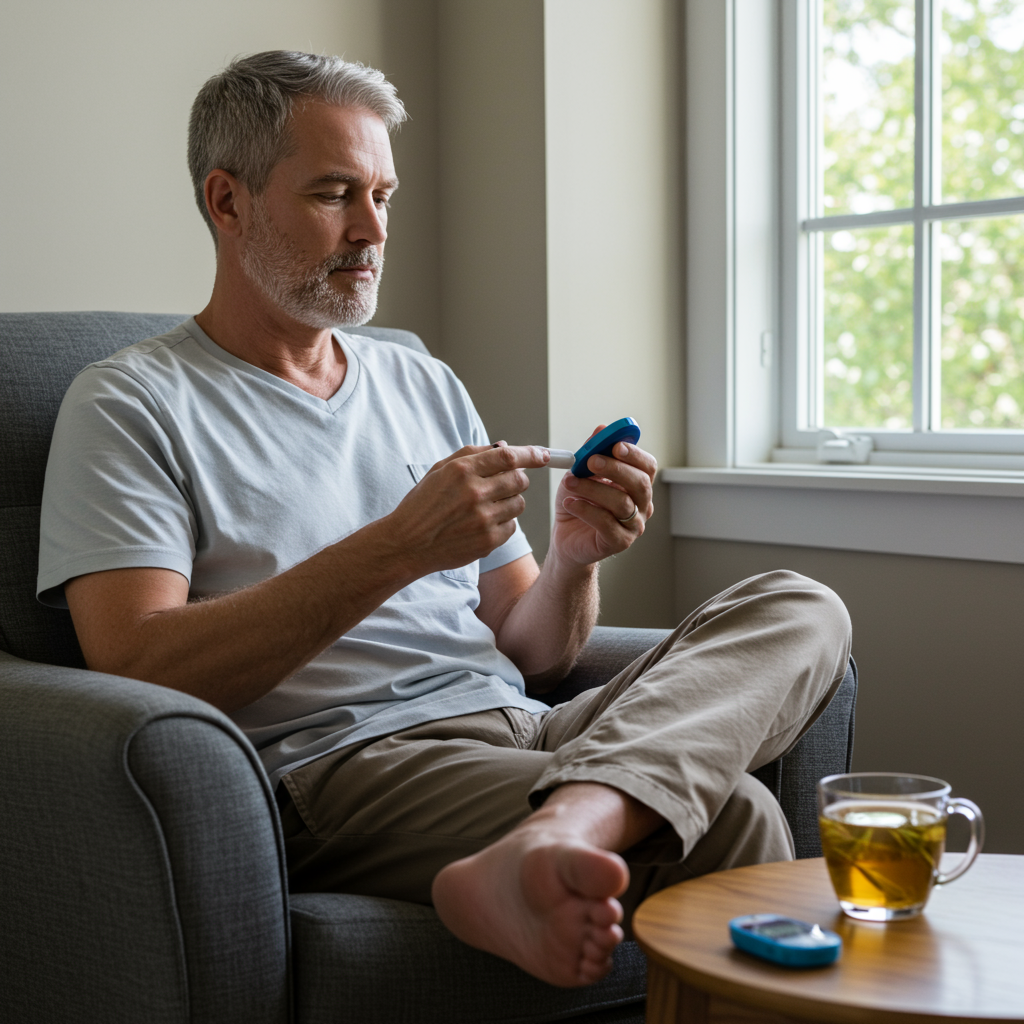The Cortisol Connection: Why Stress Management Is Crucial for Diabetes Control
For decades, diabetes management has centered around blood glucose monitoring, insulin administration, and carbohydrate counting. While these remain foundational aspects of care, emerging research points to a critical but often overlooked factor: stress management. As someone who regularly examines the neurobiological mechanisms that impact our health, I'm fascinated by how our body's stress response can significantly impact blood glucose regulation – sometimes as powerfully as the food we eat.
The Physiological Stress-Glucose Connection
When we experience stress, our body initiates a cascade of hormonal responses designed to prepare us for action. The sympathetic nervous system triggers the release of stress hormones like cortisol and adrenaline. These hormones serve an evolutionary purpose – they mobilize energy resources (primarily glucose) to fuel our muscles for a "fight or flight" response.
For people with diabetes, this presents a particular challenge. Cortisol signals the liver to release stored glucose into the bloodstream and simultaneously makes cells more insulin resistant. The result? Blood sugar levels rise, often significantly, even without consuming any carbohydrates. This is why many diabetes patients observe mysteriously elevated glucose readings during periods of high stress, despite careful dietary management.
The connection works bidirectionally – glucose dysregulation can also amplify stress responses. When blood sugar levels fluctuate dramatically, this creates physiological stress on the body, potentially triggering further cortisol release and creating a problematic feedback loop that can be difficult to interrupt.

Beyond Physical Stress: Psychological Factors and Sleep
It's not just acute physical stress that impacts glucose regulation. Chronic psychological stress, anxiety, and depression are all associated with poorer glycemic control in diabetes. These emotional states maintain elevated cortisol levels, perpetuating insulin resistance and glucose elevation.
Sleep disruption – both a consequence and cause of stress – adds another layer to this complex relationship. Even a single night of poor sleep can reduce insulin sensitivity by 20-25% in otherwise healthy individuals. For those with diabetes, sleep disruption can lead to higher fasting glucose levels and increased insulin requirements.
The timing of our stress exposure also matters. Cortisol naturally follows a circadian rhythm, peaking in the morning to help mobilize energy for the day ahead. When we experience significant stress in the evening – a time when cortisol should naturally decline – we disrupt this rhythm. This disruption can contribute to both sleep problems and impaired glucose regulation, creating yet another self-reinforcing cycle.
Practical Approaches to Stress Management for Glucose Control
Understanding the neurobiological connection between stress and glucose regulation empowers us to take a more comprehensive approach to diabetes management. Here are evidence-based strategies that can help break the stress-glucose cycle:

-
Deliberate cold exposure: Brief exposure to cold (like a 2-3 minute cold shower) can activate the parasympathetic nervous system, reducing cortisol and improving insulin sensitivity. Start with just 15-30 seconds of cold at the end of your shower and gradually increase duration.
-
Non-sleep deep rest (NSDR): Practices like yoga nidra or guided meditation for just 10-20 minutes can dramatically reduce cortisol levels. These protocols activate the parasympathetic "rest and digest" system, countering the effects of stress hormones.
-
Morning sunlight exposure: Getting 10-30 minutes of morning sunlight exposure helps regulate your circadian rhythm, which in turn helps normalize cortisol patterns and improve insulin sensitivity throughout the day.
-
Breathwork: Simple breathing exercises, particularly those emphasizing extended exhales (like the physiological sigh – a double inhale followed by a long exhale), can rapidly downregulate the stress response. Even 5 minutes of controlled breathing can measurably reduce cortisol levels.
-
Consistent sleep schedule: Maintaining regular sleep and wake times helps stabilize your circadian rhythm, which regulates both cortisol release and insulin sensitivity. This single habit can significantly improve glucose management.
By incorporating these practices alongside traditional diabetes management approaches, patients often find they can achieve better glucose control with less effort and medication. The neurobiological connections between our stress response systems and metabolic regulation are powerful – and leveraging this knowledge gives us additional tools for managing diabetes effectively.

Remember that stress management isn't a luxury or merely about feeling better – it's a fundamental component of physiological health that directly impacts blood glucose regulation. Just as you would monitor carbohydrate intake or check glucose levels, make stress reduction a measurable, trackable part of your diabetes management plan.
References:
Hackett, R. A., & Steptoe, A. (2017). Type 2 diabetes mellitus and psychological stress—a modifiable risk factor. Nature Reviews Endocrinology, 13(9), 547-560.
Spiegel, K., Leproult, R., & Van Cauter, E. (2007). Impact of sleep debt on metabolic and endocrine function. The Lancet, 354(9188), 1435-1439.






